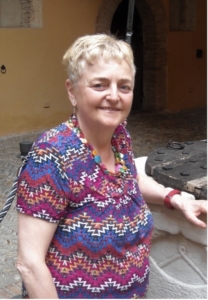Closing Diocesan phase
The Diocesan Inquiry of the Cause of Canonization is nearing its conclusion
We talk about it with the postulator
Dr. Francesca Amedea Consolini, who followed as postulator the diocesan phase of Enzo Piccinini’s Cause for canonization, helps us to understand the meaning and importance of the ritual and juridical gestures we will witness in the Cathedral next Feb. 22, at the conclusion of the diocesan phase of the Cause, and presents the process of the Roman phase.

Dott.ssa Francesca Amedea Consolini
What is the importance of the conclusion ceremony of the diocesan Inquest?
The Informational Inquest represents the key event in the diocesan phase of a Cause, because its purpose is to gather testimonial and documentary evidence to support the demonstration of the Servant of God’s practice of Christian virtues, as well as his reputation for holiness. The latter is also important because, in addition to proving the virtues of a Servant of God practiced in a heroic manner, it is necessary to show that he is invoked in prayer as an intercessor. Thus, a fundamental work for the successful outcome of the entire Cause is concluded.
Who did this work, how was the evidence collected, and to whom will it be presented?
The testimonial evidence was methodically collected over the course of about two years by the Tribunal – installed on December 10, 2022 – composed of Msgr. Franco Borsari and Msgr. Riccardo Fangarezzi with notary Massimo Poggi, through direct questioning of witnesses who knew Dr. Piccinini personally. The questions put to the witnesses by the Tribunal were contained in a specific interrogatory and concerned the life of the Servant of God and in particular the individual virtues, theological, cardinal, evangelical counsels, humility and his reputation for holiness.
The documentary evidence, i.e., all published and unpublished documents proving Dr. Piccinini’s life and activities and his reputation for holiness, as well as his writings, were collected by a special “Historical Commission” that carried out its research in public and private archives. The texts of the depositions and copies of the collected documents will be publicly sealed in the ceremony, when the members of the Tribunal-including the Archbishop who formally serves as its president-will take an oath that they have carried out their task with due diligence and impartiality. We will therefore witness oaths, signatures, stamping and sealing that guarantee the authenticity and truth of the acts that will then be delivered to the Dicastery for the Causes of Saints, in the Vatican.
By what criteria were the witnesses chosen?
The criterion was to interview people who by their direct knowledge of the Servant of God could provide useful and reliable information to reconstruct his Christian life.
What will happen during the Roman phase of the Cause? Could you give us some idea about its duration?
The duration of the Roman phase cannot be absolutely estimated or predicted, because the Vatican Dicastery for the Causes of Saints receives the acts of the Causes of Canonization from all parts of the Catholic world. Each Cause has its own complexity and specificity, and therefore each requires its own particular pace of progress. We are familiar with the steps, which are common to all Causes: verification of the juridical validity of the acts of the Diocesan Inquiry, assignment of a Rapporteur who follows the drafting of the ‘Positio,’ i.e., the volume containing the depositions of the texts, their use for the demonstration of virtues and a documented biography of the Servant of God; the ‘Positio’ is then examined by a College of Theologians whose votes are presented to the Cardinal Fathers and Bishops of the Dicastery who in turn give their opinion to the Holy Father whose responsibility it is to authorize the Dicastery to issue the decree on the heroicity of virtues. All these steps take quite a long time that cannot be quantified with any reliability. May say: no less than four years.
In the Roman phase, can the Foundation and Enzo’s friends collaborate in any way?
Only by prayer and by spreading the figure of the Servant of God, with initiatives or publications in his memory. The reputation of sanctity must be continuous, persistent and indeed increasing, and an update concerning the period after the conclusion of the Inquest must be presented before the Theologians’ examination.
The Cause for canonization tends to make the Church, which will propose him to the faithful, recognize Enzo Piccinini as an exemplary model for the Christian. What message can Enzo give to the Church and to the believing man of today?
Enzo was an authentic witness to the Gospel; a man, a Christian always on a journey, seeking an ever more living and personal relationship with Christ who died and rose again; this “paschal mystery” was the meaning of his personal, family and professional life. It is the believer who never feels that he has arrived in his relationship with God and his brothers and sisters, the believer who renews himself every day in the authentic search for truth. The typical expression that also gave the title to his biography, “I have done everything to be happy,” carries precisely this message: happiness for the believer is living in everyday situations the mystery of the present, living and risen Christ. Enzo Piccinini was a man who was not content to do well what he had to do as a doctor, as a believer, as a father and husband, as a friend and trainer; he was a man who was always looking ahead, in the tension toward following Christ ever more vividly and adherently.
This also explains his “jumping in” to every situation; it was not activism, his, but a Christian dynamism stimulated by grace and the Spirit that does not give peace and does not allow one to rest on achievements. Enzo said that one can choose between seeing life pass before one, even while doing good, and living to the full, questioning oneself every day, seeking the best and living in the fullness of Baptism. It is a rich and ever timely message for those who profess to be Christians today and want to live their faith seriously at all times and in all situations.
Enzo Piccinini Foundation


